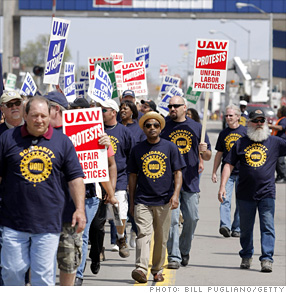
They get asked that question every time there's a new round of union negotiations. Up until recently, the answer was usually "No, we won't." In 2007 negotiations, the union agreed to major concessions and just recently, it said it was willing to consider more.
But the real problem for carmakers isn't the workers in the factories. It's the retirees. Before the 2007 negotiations, domestic automakers paid more than twice as much per worker hour in labor costs than Japanese competitors making cars here. But the actual hourly pay for workers was very nearly the same.
Domestic manufacturers have been making cars here much longer. That means they have many more retirees. The cost of health care for them is a big part of what drives up the overall hourly cost. And having been here longer, the Big Three have more experienced workers who command the top pay range.
In the 2007 round of contract negotiations, retiree health-care costs were shifted to an outside fund so that after 2010, those costs will not be reflected on the automakers' books. Carmakers are now also allowed to pay new workers a lower hourly rate than current workers. That will save substantial costs in the future, with more future savings with further concessions.
NEXT: Warranty protection
